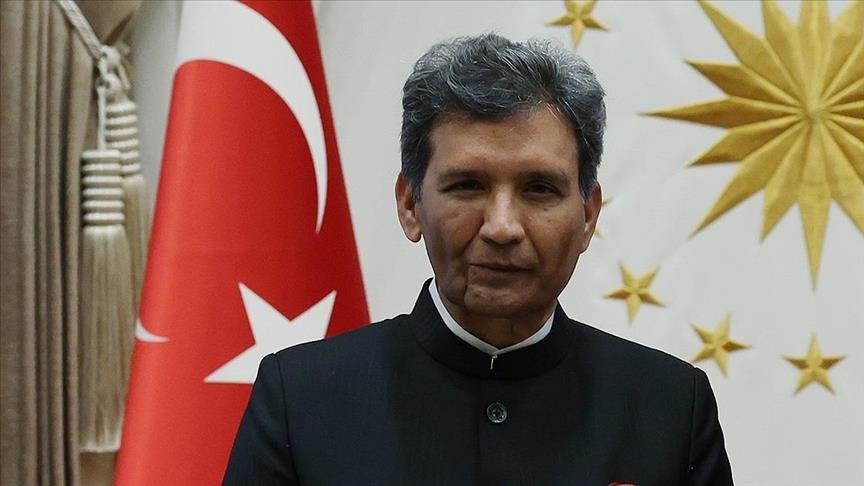ANKARA
Türkiye’s geographical location, its Eurasian identity, and its Asia Anew initiative “offer new possibilities” in bilateral relations, the Indian ambassador has said.
“These are the facts of life. And these facts offer new possibilities for our two countries to work closer together,” Virander Paul told Anadolu Agency in an interview.
Expressing optimism about bilateral relations, Paul said there is “tremendous potential” between Türkiye and India.
“Through joint efforts, and through better understanding, we can do much, much better to make this partnership even stronger,” he said, boasting of $10 billion bilateral trade between the two countries.
Relations with Türkiye “are not new,” he said, adding: “It is centuries old. It is a civilizational connect between our two countries.”
Recalling an earlier short trip to the Turkish capital Ankara, Paul said his new stint as ambassador has revealed to him “cultural affinity and mutual goodwill” between the two peoples which “is very overwhelming.”
“And that gives me confidence that the future (of bilateral relations) is bright,” he added.
“In the contemporary times, if you look at the two countries, how the two countries are placed internationally, I think there’s a lot they can do together,” Paul said.
Noting that India has attained “diversified strategic reach,” the Indian ambassador said: “It adds to the possibilities of having closer and stronger ties with Türkiye.”
“If we have deeper mutual understanding, if we have shared effort to do things in a way that there is mutual respect, mutual understanding, and a shared desire to improve this relationship… I have no doubt that in the times to come, we have a much, much stronger relationship in all walks of life,” he said.
Bilateral trade, tourism
Paul, who earlier served as India’s ambassador in Kenya, said he was “very happy that our bilateral trade has been progressively increasing, despite the COVID-19-related constraints.”
“We have registered growth in our bilateral trade. Our trade has already crossed the figure of $10 billion,” he said.
“We are happy, but we are not fully satisfied, because we can do better,” Paul said.
Recalling his diplomatic engagements since his posting in Ankara three months ago, Paul said: “Those conversations give me confidence that we can work together realistically to reach a chain target of $20 billion in the coming years.”
Paul identified infrastructure, construction, technologies, IT, textiles, automotive as areas where the two sides can invest.
“If the business communities interact with each other more, the two sides will be able to come up with new opportunities to invest in each other’s country,” he added.
Acknowledging Türkiye has traditionally been a “very important and popular tourist destination for Indians,” the Indian ambassador said: “This is not something new, it has always been like this because it’s a very attractive country, it’s a country deeply steeped in cultural heritage and history.”
“We are very much aware of that. My own experience here are three months (which) gives me confidence that tourism is a very important item on the larger menu of our bilateral cooperation,” he said, adding that the number of Indian tourists visiting Türkiye “has indeed been very impressively increasing.”
“It will continue to increase as we seek to have more and more facilities between the two countries. And having said that, I would like to add that India too would like to match these increasing numbers,” he said.
“There is a lot in India, for our Turkish friends’ experience, ranging from the art and architecture of India, the mountains, the beaches, the adventure, the food and the rest of it,” said Paul.
However, he said if relations between two countries “are good, if there is mutual goodwill and respect for each other, and the overall partnership is solid, forward looking… naturally, good tourism flows automatically.”
India’s ‘vision’ during G20 presidency
Noting that India was “serving the needs” of around 1.4 billion people, Paul said the theme of India’s G20 presidency, which begins next month, “is very self-evident – ‘One Earth, One family and one future’.”
“It is all about the importance of promoting universal oneness for global progress,” said the ambassador.
Calling terrorism, climate change and pandemic as “serious global challenges,” he added: “The issues of energy security, food security, global supplies of medical products… are the areas where we believe we can work together, we need strong, collective leadership, and G20 countries, and the G20 mechanism, I believe, is very well placed to deliver results on the ground.”
“And (during) India’s presidency, we also believe that the voice of the global south will also be important. It is very important to take into account their aspirations and their concerns as we move forward,” Paul concluded.

